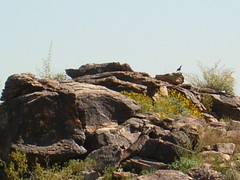History texts and Chinese/Japanese relations
History is the most dangerous product evolved from the chemistry of the intellect. ...History will justify anything. It teaches precisely nothing, for it contains everything and furnishes examples of everything.
Paul Valery
The current row between Japan and China over history texts is like a koan, it is at once significant and at the same time totally meaningless. Of course the current bickering is over more than just the newly published texts which bear a decidedly right-wing slant. There are the constant visits by Japanese heads of state to Yasukuni Shrine. There is the dispute over the Chunxiou gas fields in the East China Sea. There is Japan's bid for a seat on the UN Security Council. But most of these are beyond the purview if this blog. Since education is, I'll focus on the history education thread.
The specific omissions of the recently published history texts appear to be significant. I have not seen or read the texts, but it hardly matters. There is a constant background noise in education and outside that the militaristic Japanese government at the turn of the century was not the blame for the incredible atrocities before and during World War Two both in other nations and within Japan itself. Even with the texts available some teachers prefer to ignore the difficult issues that appear in Japanese history since the Meiji Era. In a report on NHK radio this morning, a commentator stated that students know much more about ancient Japanese history, the example given was the Jomon Era, than they do about recent events.
The din of alternative messages about Japan's wartime history is far more influencial. For example there are numerous television programs around August, which corresponds to the Obon celebrations and the bombing of Hiroshima and Nagasaki, that present Japan and soldiers of the empire as victims, not perpetrators of destruction. Students visit Hiroshima and Nagasaki, scenes of mass destruction by the US. What they learn there is that America dropped these terrible weapons on defenseless people. One elementary school student that I taught some years back, after returning from a school field trip to Nagasaki, verbally attacked me as an American who was responsible for the death and destruction of the atomic bombs. I can't help but be sympathetic. There are arguments that go both ways on the decisions to use those bombs. However, this story alone, out of context, does not make for a well informed young person. Schools teach, as do all of the other sources of background noise, with the constant mantra of peaceful Japan, international Japan, safe Japan.
This issue is also meaningless, because formal education in general, and history education specifically, is just not that effective by itself. Especially in Japan it is a process of rote memorization, far from an intellectual comparison of sources to arrive at an objective conclusion. How much do these factoids influence us as individuals, regardless of which textbook we use? I was once required by a history teacher to memorize all of the American presidents and their political affiliations. I did it, but it did not serve to shape my opinions of America one iota. My opinions of America came almost entirely from independent reading and discussions with family and friends. James W. Loewen's book, Lies My Teacher Told Me is a fantastic example of this idea. After surveying twelve high school history texts, he came to the conclusion that none of them did a decent job of teaching history.
There is a historic atmosphere is distrust and suspicion between China and Japan. The history text issue is part of the issue, but certainly not the whole of it. It is also arguable that the textbooks have little or no real influence over student opinions, compared with the omnipresent background noise.


